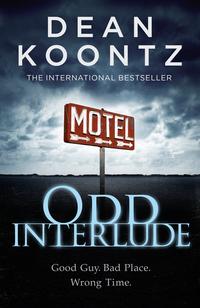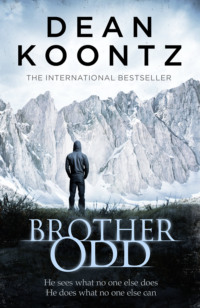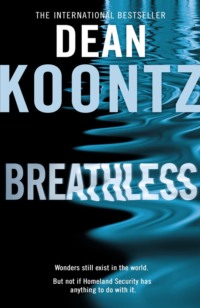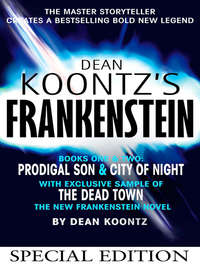
Полная версия
The Husband
Another secretary, Nancy Farasand, had said, “She called in sick, Mitch. Didn’t you know?”
“When I left home this morning, she was a little queasy,” he lied, “but she thought it would pass.”
“It didn’t pass. She said it’s like a summer flu. She was so disappointed.”
“I better call her at home,” he said, but of course he had already tried reaching her there.
He had spoken to Nancy more than ninety minutes ago, between conversations with detectives.
Passing minutes unwind a watch spring; but they had wound Mitch tight. He felt as though something inside his head was going to pop.
A fat bumblebee returned to him from time to time, hovering, buzzing close, perhaps attracted by his yellow T-shirt.
Across the street, toward the end of the block, two women and a man were standing on a front lawn, watching the police: neighbors gathered for the drama. They had been there since the sirens had drawn them outside.
Not long ago, one of them had gone into a house and had returned with a tray on which stood glasses of what might have been iced tea. The glasses sparkled in the sunlight.
Earlier, the detectives had walked up the street to question that trio. They had interviewed them only once.
Now the three stood sipping tea, chatting, as if unconcerned that a sniper had cut down someone who had been walking in their community. They appeared to be enjoying this interlude, as though it presented a welcome break from their usual routine, even if it came at the cost of a life.
To Mitch, the neighbors seemed to spend more time staring toward him than at any of the police or CSI technicians. He wondered what, if anything, the detectives had asked them about him.
None of the three used the services of Big Green. From time to time, they would have seen him in the neighborhood, however, because he took care of four properties on this street.
He disliked these tea drinkers. He had never met them, did not know their names, but he viewed them with an almost bitter aversion.
Mitch disliked them not because they seemed perversely to be enjoying themselves, and not because of what they might have said about him to the police. He disliked the three—could have worked up a loathing for them—because their lives were still in order, because they did not live under the threat of imminent violence against someone they loved.
Although irrational, his animosity had a certain value. It distracted him from his fear for Holly, as did his continuous fretful analysis of the detectives’ actions.
If he dared to give himself entirely to worry about his wife, he would go to pieces. This was no exaggeration. He was surprised at how fragile he felt, as he never had felt previously.
Each time her face rose in his mind, he had to banish it because his eyes grew hot, his vision blurred. His heart fell into an ominous heavy rhythm.
An emotional display, so out of proportion even to the shock of seeing a man shot, would require an explanation. He dared not reveal the truth, and he didn’t trust himself to invent an explanation that would convince the cops.
One of the homicide detectives—Mortonson—wore dress shoes, black slacks, and a pale-blue shirt. He was tall, solid, and all business.
The other—Lieutenant Taggart—wore white sneakers, chinos, and a red-and-tan Hawaiian shirt. He was less physically intimidating than Mortonson, less formal in his style.
Mitch’s wariness of Taggart exceeded his concern about the more imposing Mortonson. The lieutenant’s precisely trimmed hair, his glass- smooth shave, his perfect veneered teeth, his spotless white sneakers suggested that he adopted casual dress and a relaxed demeanor to mislead and to put at ease the suspects unfortunate enough to come under his scrutiny.
The detectives first interviewed Mitch in tandem. Later, Taggart had returned alone, supposedly to have Mitch “refine” something he had said earlier. In fact, the lieutenant repeated every question he and Mortonson had asked before, perhaps anticipating contradictions between Mitch’s answers and those that he had given previously.
Ostensibly, Mitch was a witness. To a cop, however, when no killer had been identified, every witness also counted as a suspect.
He had no reason to kill a stranger walking a dog. Even if they were crazy enough to think he might have done so, they would have to believe that Iggy was his accomplice; clearly Iggy did not interest them.
More likely, though they knew he’d had no role in the shooting, their instinct told them that he was concealing something.
Now here came Taggart yet again, his sneakers so white that they appeared to be radiant.
As the lieutenant approached, Mitch rose to his feet, wary and sick with worry, but trying to appear merely weary and impatient.
4
Detective Taggart sported an island tan to match his Hawaiian shirt. By contrast with his bronze face, his teeth were as white as an arctic landscape.
“I’m sorry for all this inconvenience, Mr. Rafferty. But I have just a couple more questions, and then you’re free to go.”
Mitch could have replied with a shrug, a nod. But he thought that silence might seem peculiar, that a man with nothing to hide would be forthcoming.
Following an unfortunate hesitation long enough to suggest calculation, he said, “I’m not complaining, Lieutenant. It could just as easily have been me who was shot. I’m thankful to be alive.”
The detective strove for a casual demeanor, but he had eyes like those of a predatory bird, hawk-sharp and eagle-bold. “Why do you say that?”
“Well, if it was a random shooting…”
“We don’t know that it was,” said Taggart. “In fact, the evidence points to cold calculation. One shot, perfectly placed.”
“Can’t a crazy with a gun be a skilled shooter?”
“Absolutely. But crazies usually want to rack up as big a score as possible. A psychopath with a rifle would have popped you, too. This guy knew exactly who he wanted to shoot.”
Irrationally, Mitch felt some responsibility for the death. This murder had been committed to ensure that he would take the kidnapper seriously and would not seek police assistance.
Perhaps the detective had caught the scent of this unearned but persistent guilt.
Glancing toward the cadaver across the street, around which the CSI team still worked, Mitch said, “Who’s the victim?”
“We don’t know yet. No ID on him. No wallet. Don’t you think that’s peculiar?”
“Going out just to walk the dog, you don’t need a wallet.”
“It’s a habit with the average guy,” Taggart said. “Even if he’s washing the car in the driveway, he has his wallet.”
“How will you identify him?”
“There’s no license on the dog’s collar. But that’s almost a show-quality golden, so she might have a microchip ID implant. As soon as we get a scanner, we’ll check.”
Having been moved to this side of the street, tied to a mailbox post, the golden retriever rested in shade, graciously receiving the attention of a steady procession of admirers.
Taggart smiled. “Goldens are the best. Had one as a kid. Loved that dog.”
His attention returned to Mitch. His smile remained in place, but the quality of it changed. “Those questions I mentioned. Were you in the military, Mr. Rafferty?”
“Military? No. I was a mower jockey for another company, took some horticulture classes, and set up my own business a year out of high school.”
“I figured you might be ex-military, the way gunfire didn’t faze you.”
“Oh, it fazed me,” Mitch assured him.
Taggart’s direct gaze was intended to intimidate.
As if Mitch’s eyes were clear lenses through which his thoughts were revealed like microbes under a microscope, he felt compelled to avoid the detective’s stare, but sensed that he dared not.
“You hear a rifle,” Taggart said, “see a man shot, yet you hurry across the street, into the line of fire.”
“I didn’t know he was dead. Might’ve been something I could do for him.”
“That’s commendable. Most people would scramble for cover.”
“Hey, I’m no hero. My instincts just shoved aside my common sense.”
“Maybe that’s what a hero is—someone who instinctively does the right thing.”
Mitch dared to look away from Taggart, hoping that his evasion, in this context, would be interpreted as humility. “I was stupid, Lieutenant, not brave. I didn’t stop to think I might be in danger.”
“What—you thought he’d been shot accidentally?”
“No. Maybe. I don’t know. I didn’t think anything. I didn’t think, I just reacted.”
“But you really didn’t feel like you were in danger?”
“No.”
“You didn’t realize it even when you saw his head wound?”
“Maybe a little. Mostly I was sickened.”
The questions came too fast. Mitch felt off balance. He might unwittingly reveal that he knew why the dogwalker had been killed.
With a buzz of busy wings, the bumblebee returned. It had no interest in Taggart, but hovered near Mitch’s face, as if bearing witness to his testimony.
“You saw the head wound,” Taggart continued, “but you still didn’t scramble for cover.”
“No.”
“Why not?”
“I guess I figured if somebody hadn’t shot me by then, they weren’t going to shoot me.”
“So you still didn’t feel in danger.”
“No.”
Flipping open his small spiral-bound notebook, Taggart said, “You told the 911 operator that you were dead.”
Surprised, Mitch met the detective’s eyes again. “That I was dead?”
Taggart quoted from the notebook: “‘A man’s been shot. I’m dead. I mean, he’s dead. He’s been shot, and he’s dead.’”
“Is that what I said?”
“I’ve heard the recording. You were breathless. You sounded flat-out terrified.”
Mitch had forgotten that 911 calls were recorded. “I guess I was more scared than I remember.”
“Evidently, you did recognize a danger to yourself, but still you didn’t take cover.”
Whether or not Taggart could read anything of Mitch’s thoughts, the pages of the detective’s own mind were closed, his eyes a warm but enigmatic blue.
“‘I’m dead,’” the detective quoted again.
“A slip of the tongue. In the confusion, the panic.”
Taggart looked at the dog again, and again he smiled. In a voice softer than it had been previously, he said, “Is there anything more I should have asked you? Anything you would like to say?”
In memory, Mitch heard Holly’s cry of pain.
Kidnappers always threaten to kill their hostage if the cops are brought in. To win, you don’t have to play the game by their rules.
The police would contact the Federal Bureau of Investigation. The FBI had extensive experience in kidnapping cases.
Because Mitch had no way to raise two million, the police would at first doubt his story. When the kidnapper called again, however, they would be convinced.
What if the second call didn’t come? What if, knowing that Mitch had gone to the police, the kidnapper fulfilled his threat, mutilated Holly, killed her, and never called again?
Then they might think that Mitch had concocted the kidnapping to cover the fact that Holly was already dead, that he himself had killed her. The husband is always the primary suspect.
If he lost her, nothing else would matter. Nothing ever. No power could heal the wound that she would leave in his life.
But to be suspected of harming her—that would be hot shrapnel in the wound, ever burning, forever lacerating.
Closing the notebook and returning it to a hip pocket, shifting his attention from the dog to Mitch, Taggart asked again, “Anything, Mr. Rafferty?”
At some point during the questioning, the bumblebee had flown away. Only now, Mitch realized that the buzzing had stopped.
If he kept the secret of Holly’s abduction, he would stand alone against her kidnappers.
He was no good alone. He had been raised with three sisters and a brother, all born within a seven-year period. They had been one another’s confidants, confessors, counsels, and defenders.
A year after high school, he moved out of his parents’ house, into a shared apartment. Later, he had gotten his own place, where he felt isolated. He had worked sixty hours a week, and longer, just to avoid being alone in his rooms.
He had felt complete once more, fulfilled, connected, only when Holly had come into his world. I was a cold word; we had a warmer sound. Us rang sweeter on the ear than me.
Lieutenant Taggart’s eyes seemed less forbidding than they had been heretofore.
Mitch said, “Well…”
The detective licked his lips.
The air was warm, humidity low. Mitch’s lips felt dry, too.
Nevertheless, the quick pink passage of Taggart’s tongue seemed reptilian, and suggested that he was mentally savoring the taste of pending prey.
Only paranoia allowed the twisted thought that a homicide detective might be allied with Holly’s abductors. This private moment between witness and investigator in fact might be the ultimate test of Mitch’s willingness to follow the kidnapper’s instructions.
All the flags of fear, both rational and irrational, were raised high in his mind. This parade of rampant dreads and dark suspicions did not facilitate clear thinking.
He was half convinced that if he told Taggart the truth, the detective would grimace and say We’ll have to kill her now, Mr. Rafferty. We can’t trust you anymore. But we’ll let you choose what we cut off first—her fingers or her ears.
As earlier, when he’d been standing over the dead man, Mitch felt watched, not just by Taggart and the tea-drinking neighbors, but by some presence unseen. Watched, analyzed.
“No, Lieutenant,” he said. “There’s nothing more.”
The detective retrieved a pair of sunglasses from his shirt pocket and put them on.
In the mirrored lenses, Mitch almost didn’t recognize the twin reflections of his face. The distorting curve made him look old.
“I gave you my card,” Taggart reminded him.
“Yes, sir. I have it.”
“Call me if you remember anything that seems important.”
The smooth, characterless sheen of the sunglasses was like the gaze of an insect: emotionless, eager, voracious.
Taggart said, “You seem nervous, Mr. Rafferty.”
Raising his hands to reveal how they trembled, Mitch said, “Not nervous, Lieutenant. Shaken. Badly shaken.”
Taggart licked his lips once more.
Mitch said, “I’ve never seen a man murdered before.”
“You don’t get used to it,” the detective said.
Lowering his hands, Mitch said, “I guess not.”
“It’s worse when it’s a woman.”
Mitch did not know what to make of that statement. Perhaps it was a simple truth of a homicide detective’s experience—or a threat.
“A woman or a child,” Taggart said.
“I wouldn’t want your job.”
“No. You wouldn’t.” Turning away, the detective said, “I’ll be seeing you, Mr. Rafferty.”
“Seeing me?”
Glancing back, Taggart said, “You and I—we’ll both be witnesses in a courtroom someday.”
“Seems like a tough case to solve.”
“‘Blood crieth unto me from the ground,’ Mr. Rafferty,” said the detective, apparently quoting someone. “‘Blood crieth unto me from the ground.’”
Mitch watched Taggart walk away.
Then he looked at the grass under his feet.
The progress of the sun had put the palm-frond shadows behind him. He stood in light, but was not warmed by it.
5
The dashboard clock was digital, as was Mitch’s wristwatch, but he could hear time ticking nonetheless, as rapid as the click-click-click of the pointer snapping against the marker pegs on a spinning wheel of fortune.
He wanted to race directly home from the crime scene. Logic argued that Holly would have been snatched at the house. They would not have grabbed her on the way to work, not on a public street.
They might unintentionally have left something behind that would suggest their identity. More likely, they would have left a message for him, further instructions.
As usual, Mitch had begun the day by picking up Iggy at his apartment in Santa Ana. Now he had to return him.
Driving north from the fabled and wealthy Orange County coastal neighborhoods where they worked, toward their humbler communities, Mitch switched from the crowded freeway to surface streets, but encountered traffic there, as well.
Iggy wanted to talk about the murder and the police. Mitch had to pretend to be as naively excited by the novelty of the experience as Iggy was, when in fact his mind remained occupied with thoughts of Holly and with worry about what might come next.
Fortunately, as usual, Iggy’s conversation soon began to loop and turn and tangle like a ball of yarn unraveled by a kitten.
Appearing to be engaged in this rambling discourse required less of Mitch than when the subject had been the dead dogwalker.
“My cousin Louis had a friend named Booger,” Iggy said. “The same thing happened to him, shot while walking a dog, except it wasn’t a rifle and it wasn’t a dog.”
“Booger?” Mitch wondered.
“Booker,” Iggy corrected. “B-o-o-k-e-r. He had a cat he called Hairball. He was walking Hairball, and he got shot.”
“People walk cats?”
“The way it was—Hairball is cozy in a travel cage, and Booker is carrying him to a vet’s office.”
Mitch repeatedly checked the rearview and side mirrors. A black Cadillac SUV had departed the freeway in their wake. Block after block, it remained behind them.
“So Booker wasn’t actually walking the cat,” Mitch said.
“He was walking with the cat, and this like twelve-year-old brat, this faucet-nosed little dismo, shot Booker with a paint-ball gun.”
“So he wasn’t killed.”
“He wasn’t quashed, no, and it was a cat instead of a dog, but Booker was totally blue.”
“Blue?”
“Blue hair, blue face. He was fully pissed.”
The Cadillac SUV reliably remained two or three vehicles behind them. Perhaps the driver hoped Mitch wouldn’t notice him.
“So Booker’s all blue. What happened to the kid?” Mitch asked.
“Booker was gonna break the little dismo’s hand off, but the kid shot him in the crotch and ran. Hey, Mitch, did you know there’s a town in Pennsylvania named Blue Balls?”
“I didn’t know.”
“It’s in Amish country. There’s another town nearby called Intercourse.”
“How about that.”
“Maybe those Amish aren’t as square as Cheez-Its, after all.”
Mitch accelerated to cross an intersection before the traffic light phased to red. Behind him, the black SUV changed lanes, sped up, and made it through on the yellow.
“Did you ever eat an Amish shoofly pie?” Iggy asked.
“No. Never did.”
“It’s full-on rich, sweeter than six Gidget movies. Like eating molasses. Treacherous, dude.”
The Cadillac dropped back, returned to Mitch’s lane. Three vehicles separated them once more.
Iggy said, “Earl Potter lost a leg eating shoofly pie.”
“Earl Potter?”
“Tim Potter’s dad. He was diabetic, but he didn’t know it, and he totally destroyed like a bucket of sweets every day. Did you ever eat a Quakertown pie?”
“What about Earl’s leg?” Mitch asked.
“Unreal, bro. One day his foot’s numb, he can’t walk right. Turns out he’s got almost no circulation down there ’cause of radical diabetes. They sawed his left leg off above the knee.”
“While he was eating shoofly pie.”
“No. He realized he had to give up sweets.”
“Good for him.”
“So the day before surgery, he had his last dessert, and he chose a whole shoofly pie with like a cow’s worth of whipped cream. Did you ever see that stylin’ Amish movie with Harrison Ford and the girl with the great knockers?”
By way of Hairball, Blue Balls, Intercourse, shoofly pie, and Harrison Ford, they arrived at Iggy’s apartment building.
Mitch stopped at the curb, and the black SUV went past without slowing. The side windows were tinted, so he couldn’t see the driver or any passengers.
Opening his door, before getting out of the truck, Iggy said, “You okay, boss?”
“I’m okay.”
“You look stomped.”
“I saw a guy shot to death,” Mitch reminded him.
“Yeah. Wasn’t that radical? I guess I know who’s gonna rule the bar at Rolling Thunder tonight. Maybe you should stop in.”
“Don’t save a stool for me.”
The Cadillac SUV dwindled westward. The afternoon sun wrapped the suspicious vehicle in glister and glare. It shimmered and seemed to vanish into the solar maw.
Iggy got out of the truck, looked back in at Mitch, and pulled a sad face. “Ball and chain.”
“Wind beneath my wings.”
“Whoa. That’s goob talk.”
“Go waste yourself.”
“I do intend to get mildly polluted,” Iggy assured him. “Dr. Ig prescribes at least a six-pack of cerveza for you. Tell Mrs. Mitch I think she’s an uber wahine.”
Iggy slammed the door and walked away, big and loyal and sweet and clueless.
With hands that were suddenly shaky on the wheel, Mitch piloted the truck into the street once more.
Coming north, he had been impatient to be rid of Iggy and to get home. Now his stomach turned when he considered what might wait for him there.
What he most feared was finding blood.
6
Mitch drove with the truck windows open, wanting the sounds of the streets, proof of life.
The Cadillac SUV did not reappear. No other vehicle took up the pursuit. Evidently, he had imagined the tail.
His sense of being under surveillance passed. From time to time, his eyes were drawn to the rearview mirror, but no longer with the expectation of seeing anything suspicious.
He felt alone, and worse than alone. Isolated. He almost wished that the black SUV would reappear.
Their house was in an older neighborhood of Orange, one of the oldest cities in the county. When he turned onto their street, except for the vintage of the cars and trucks, a curtain in time might have parted, welcoming him to 1945.
The bungalow—pale-yellow clapboard, white trim, a cedar-shingle roof—stood behind a picket fence on which roses twined. Some larger and some nicer houses occupied the block, but none boasted better landscaping.
He parked in the driveway beside the house, under a massive old California pepper tree, and stepped out into a breathless afternoon.
Sidewalks and yards were deserted. In this neighborhood, most families relied on two incomes; everyone was at work. At 3:04, no latchkey kids were yet home from school.
No maids, no window washers, no gardening services busy with leaf blowers. These homeowners swept their own carpets, mowed their own yards.
The pepper tree braided the sunshine in its cascading tresses, and littered the shadowed pavement with elliptical slivers of light.
Mitch opened a side gate in the picket fence. He crossed the lawn to the front steps.
The porch was deep and cool. White wicker chairs with green cushions stood beside small wicker tables with glass tops.
On Sunday afternoons, he and Holly often sat here, talking, reading the newspaper, watching hummingbirds flit from one crimson bloom to another on the trumpet vines that flourished on the porch posts.
Sometimes they unfolded a card table between the wicker chairs. She crushed him at Scrabble. He dominated the trivia games.
They didn’t spend much on entertainment. No skiing vacations, no weekends in Baja. They seldom went out to a movie. Being together on the front porch offered as much pleasure as being together in Paris.
They were saving money for things that mattered. To allow her to risk a career change from secretary to real-estate agent. To enable him to do some advertising, buy a second truck, and expand the business.







